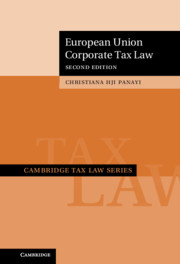Book contents
- Frontmatter
- Dedication
- Contents
- Foreword to the First Edition by Malcolm Gammie QC
- Foreword to the First Edition by Michael Lang
- Foreword to the Second Edition by Philip Baker
- Preface to the First Edition
- Preface to the Second Edition
- 1 A Historical Trajectory of EU Corporate Tax Law
- 2 EU Corporate Tax Legislation
- 3 The Court of Justice and the Development of EU Corporate Tax Law
- 4 Tax Obstacles to the Cross-Border Movement of Companies: Direct Investment
- 5 Tax Obstacles to Cross-Border Portfolio Investment
- 6 Reorganisations under EU Tax Law
- 7 Tax Avoidance and EU Law
- 8 State Aid and Taxation
- 9 EU Corporate Tax Law: More Interim Conclusions and Thoughts
4 - Tax Obstacles to the Cross-Border Movement of Companies: Direct Investment
Published online by Cambridge University Press: 28 May 2021
- Frontmatter
- Dedication
- Contents
- Foreword to the First Edition by Malcolm Gammie QC
- Foreword to the First Edition by Michael Lang
- Foreword to the Second Edition by Philip Baker
- Preface to the First Edition
- Preface to the Second Edition
- 1 A Historical Trajectory of EU Corporate Tax Law
- 2 EU Corporate Tax Legislation
- 3 The Court of Justice and the Development of EU Corporate Tax Law
- 4 Tax Obstacles to the Cross-Border Movement of Companies: Direct Investment
- 5 Tax Obstacles to Cross-Border Portfolio Investment
- 6 Reorganisations under EU Tax Law
- 7 Tax Avoidance and EU Law
- 8 State Aid and Taxation
- 9 EU Corporate Tax Law: More Interim Conclusions and Thoughts
Summary
In Chapter 4, some of the tax obstacles arising in the cross-border movement of companies were examined, the emphasis being firstly on direct investment. It was reiterated that EU law does not impose any immediate obligations on Member States on how to structure their corporate tax systems in terms of rates, taxable base, depreciation and so on. What EU law does is to prevent Member States from imposing rules that hinder a domestic company from carrying on its business in another Member State (home State obstacles), or rules that hinder a non-resident company from carrying on its business in a similar way to domestic companies (host State obstacles). As far as companies were concerned, issues such as expenses in foreign holdings and cross-border loss relief were considered. As far as permanent establishments are concerned, apart from different treatment compared to subsidiaries, issues such as loss relief, notional expenses, attribution of profits were examined.
- Type
- Chapter
- Information
- European Union Corporate Tax Law , pp. 134 - 192Publisher: Cambridge University PressPrint publication year: 2021

